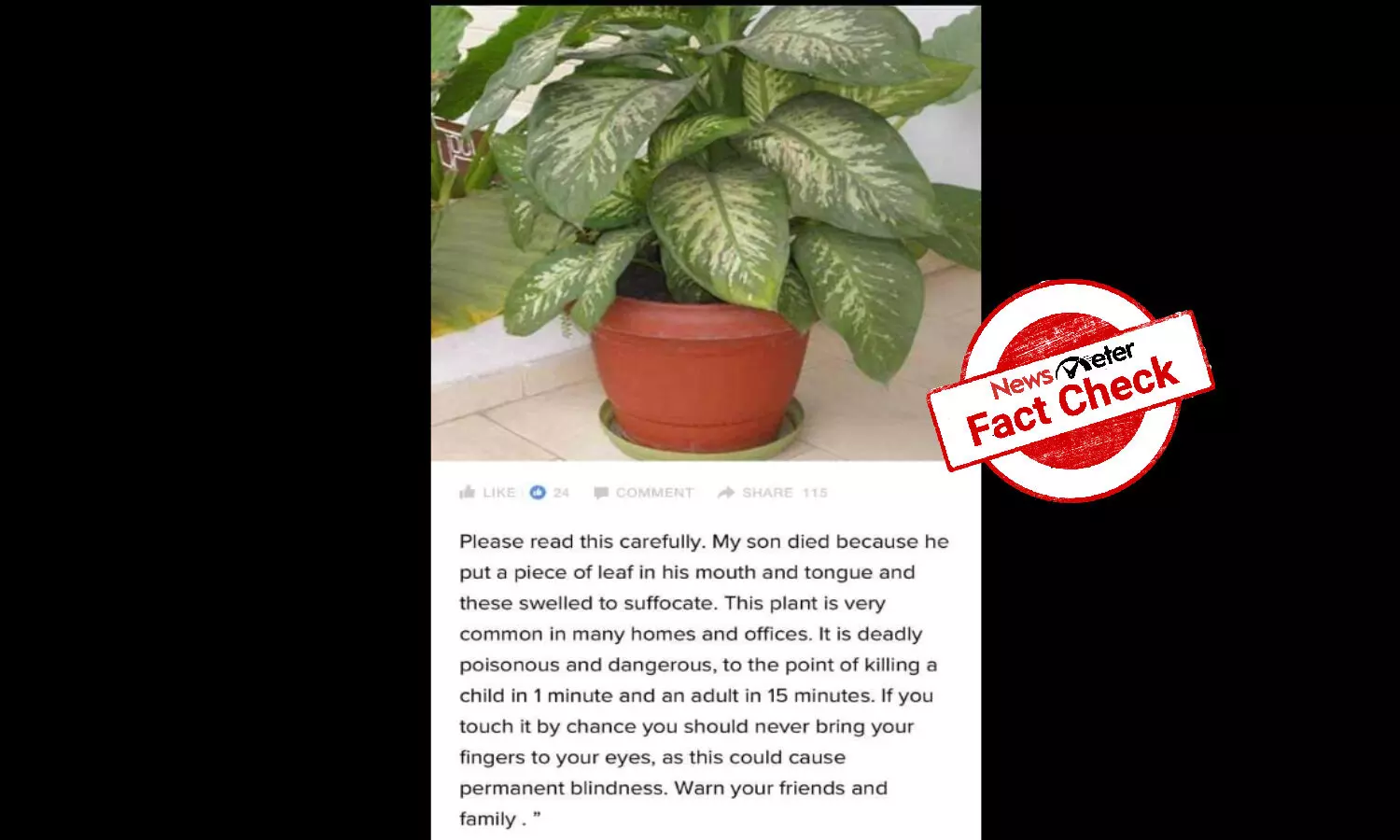Can 'Dieffenbachia' plant cause death or blindness?
Several Facebook posts and web articles have overly exaggerated the upshot of `Dieffenbachia’, one of the most common indoor plants.
By Sunanda Naik
Several Facebook posts and web articles have overly exaggerated the upshot of `Dieffenbachia', one of the most common indoor plants.
It is being claimed that "the plant is so poisonous and it can kill a child in one minute and an adult in 15 minutes".
NewsMeter found one post claiming that it can even cause permanent blindness. "Dangerous to the point of killing a child in one minute and an adult in 15 minutes and can cause blindness, too. If you touch it by chance you should never bring your fingers to your eyes, as this could cause permanent blindness. Warn your friends and your family," read one caption.
We also found a few articles and Twitter posts for the same.
Plantitos and Plantitas, just a reminder lang po. Dieffenbachia or Dumbcane is a poisonous houseplant. Keep away from children and animals.
— 𝚌𝚑𝚊𝚎 (ノ◕ヮ◕)ノ*:・゚✧ ♡ ʸᵉˢᵘⁿᵍ (@ihobiyaaahhh) July 29, 2022
Saw a post na nakain ng baby nya yun plant and was rushed to the hospital. Please be careful if you have this houseplant. 😔 pic.twitter.com/Xd556bz9qQ
Dumbcane teaches me more about transformation- when I see its resilience against all odds.
— Elizabeth O #EndSarsNow (@reinelade) June 6, 2020
It is poisonous & was once used to punish 'unruly slaves(check "Dieffenbachia slaves").
Historically, it moved from an instrument of torture to a symbol of beauty.
*Air Purifer 🙌🏾 🌱 pic.twitter.com/R0229e7x4J
Is this common plant deadly? Can this cause permanent vision loss? Let's debunk with the facts.
FACT CHECK
According to Oxford University's plant science department, the genus has 25 to 50 species. The toxicity of the plant is widely recorded. According to Oxford Plants 400, the plant's sap contains calcium oxalate, which is poisonous and associated with the formation of kidney stones.
Oxford Plants 400 also warns, "Consequently, great care must be taken when handling dieffenbachia plants, especially over getting sap into the mouth and eyes. One response the sap provokes is swelling of the throat, resulting in speechlessness; hence the common name 'dumb cane'.
American Association of Poison Control Centers expert Dr. Lindsay Liu, a pharmacist and specialist in poison information told Africa Check that the "majority of the cases develop only mild symptoms". Usually, the only treatment required for mouth exposures, Liu said, "is rinsing the mouth well and drinking water or milk."
"It is possible for swelling after exposure to become so severe that it is difficult to breathe but it is very rare. If someone is exposed to the plant and they develop severe drooling, swelling of the lower face, like the lips, tongue, cheeks, and throat, difficulty breathing, or difficulty swallowing they need to be seen immediately by medical professionals."
On permanent blindness claim, NewsMeter found a study in the U.S Department Of Agriculture. "The sap from dieffenbachia can cause temporary vision loss and swelling of the eyelid,'' it said.
Liu told Africa Check: "If someone has an eye exposure to the plant and is experiencing pain they should rinse it with room temperature water for 15 minutes. After rinsing the eye, if they continue to experience pain, swelling, changes in vision, or sensitivity to light that lasts more than 15 minutes they should be seen by a medical professional."
It is concluded that the toxicity depends on the level of exposure. The consequences of exposure may stay for several days but there is no evidence that the plant is poisonous or can cause permanent vision loss.
The claim is misleading.